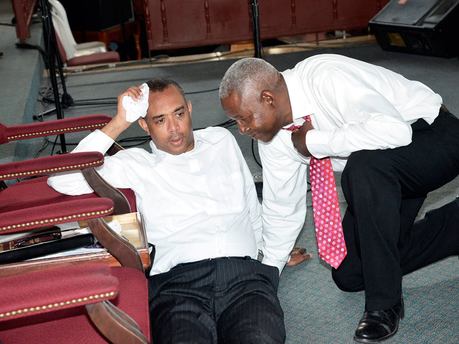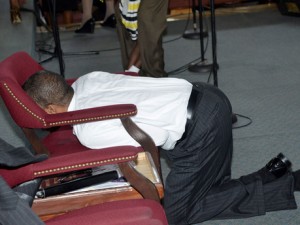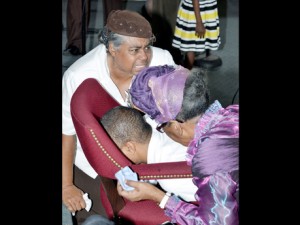Jodi-Ann Gilpin, Gleaner Writer
John-Mark Bartlett, pastor of the Pentecostal Tabernacle in downtown Kingston, could on Sunday be seen on the ground at his church, attempting to recuperate after giving his sermon.
Though a stranger to the church might have found the sight disconcerting, Bartlett assured that sermons usually take a lot of energy and weariness is a normal part of the process for most pastors.
“Yesterday (Sunday), the two sisters were prompted by the Holy Spirit to pray and that’s what they did. I was not sick or anything. The message took a lot out of me and so I was very tired after ministering. I just reclined and meditated for a while. I think I was even on the ground,” he told The Gleaner.
“Normally, I seek the Lord, and sometimes that alone can be a tiring process. I do a lot of studying and praying and then when it comes to the delivery, depending on the type of message, it takes a lot out of you. The emotional aspect sometimes takes a toll and can be very draining.”
Bartlett noted that rest was an important aspect of his daily life.
“Monday is when I rest. That’s the day when I just crash and take some time for myself so I don’t go to the office any at all,” he said.
Bishop Rowan Edwards, pastor of the Lighthouse Assembly Church in Spanish Town, St Catherine, and chairman of the Spanish Town Revival, echoed similar sentiments while adding that he has seen several life-threatening situations.
“The average pastor would have done an eight-hour shift when preparing a sermon. It’s not just the one hour that you see them on a Sunday or Saturday. It takes a lot of mental push and emotional preparation,” Edwards said.
HEALTHY LIFESTYLE
“In preparing my Christmas message, I started in the week and then I did my final preparation, starting at 3 o’clock Sunday morning until 8 a.m. A pastor has to ensure that their message is relevant and that whatever is being said is led by the Spirit. That is very integral,” he declared.
He implored ministers to take care of themselves, adding: “I know of pastors who have fainted during or after the sermon because maybe they were ill before or something happened while they were preaching and so it is important that pastors take care of themselves and ensure that they adapt a healthy lifestyles because preaching involves the spiritual, physical and emotional aspect.”
TEDIOUS PROCESS
For Reverend Dr Carla Dunbar, pastor of the Cavaliers Church of God of Prophecy in St Andrew, preaching is a tedious process.
“Many Sundays when I go home, I don’t even eat. I go straight to bed because, depending on the intensity of the message, I am very exhausted,” Dunbar said. “As a result I don’t bother to keep night services because I am big on family and I believe that people should use that time to rest.”
She added: “It’s just not a presentation and, especially for Pentecostals, it is more of a spirit-led issue and the delivery sometimes takes a lot of energy. There is also a lot of passion because the message first ministers to you as a pastor before you go onstage.
“We are preparing for days, sometimes weeks and even months, for a message because we have to ensure that our messages are well researched and accurate and that God is the centre of whatever we do, so it is very natural to be tired after a sermon.”












